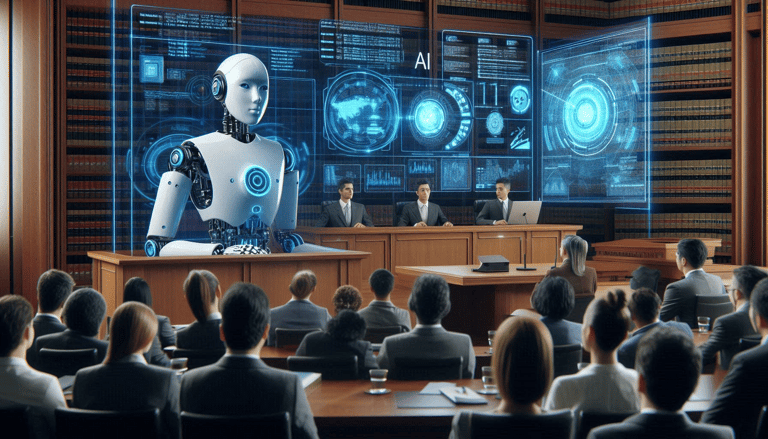From Courtrooms to Code: The Future of AI in Law
Edwin Shibu
Amity University, Dubai, UAE
This blog is written by Edwin Shibu, a Third-Year law student of Amity University, Dubai, UAE


“If you think computers are going to replace lawyers, then you don’t understand what lawyers do.”
The concept of AI taking over the legal profession is lengthy and well documented, but even better funded, and for good reason. On paper, it appears to be a perfect blend: a sector based on analyzing massive amounts of data to make difficult judgments governed by intricate regulations. Exactly the kind of thing that artificial intelligence appears to thrive at. Today, we are closer to realizing this vision than ever before.
Artificial intelligence, or AI, refers to computer software and systems that do more than just fulfill preprogrammed tasks; they also learn as they go, improving their performance through feedback. If you’re feeling weighed down by repetitive tasks, there’s good news for you: AI has the potential to transform your workflow by taking over many of those mundane, time-consuming tasks.
Lawyers often find themselves overwhelmed by the sheer volume of information they must handle—from case facts to statutes, regulations, and case laws. However, this challenge is not unique to the legal field. In our digital age, information overload affects us all, whether we are teachers, doctors, or professionals in other industries. As we accumulate more data, AI’s ability to manage and streamline this information becomes increasingly valuable across all sectors.
ChatGPT, an AI chatbot, was launched by OpenAI on November 30, 2022. From its early research stage to its current deployment across a range of platforms and applications, it has undergone constant breakthroughs and upgrades. A lot of people are questioning themselves again, now that models like GPT-4 are widely accessible and integrated: Will AI replace lawyers?
And again, the answer is no. At least not yet. And probably the biggest issue is that AI simply isn't good enough. Even while artificial intelligence (AI) is capable of poring over vast amounts of legal papers and drawing intricate conclusions by using laws as support, the truth is that AI is ignorant of the true meaning of the laws it cites. Furthermore, the lack of expressive power severely limits its ability to make decisions under uncertainty.
The second barrier that keeps AI from taking over the legal profession is barriers around the human factor. There are some things that robots cannot do, such as building client relationships, and exercising judgment when it comes to complex matters. Naturally, being able to analyze papers and draw legal conclusions is crucial, but as any lawyer will tell you, that's only half the work. The other half, and the most crucial element involves cultivating and sustaining connections with clients as well as persuading a jury comprised of real people of the emotional purity of your argument. As a result of which, we, lawyers can sleep at night knowing that we can continue to do our duties until AI reaches a degree of emotional intelligence and physical presence.
Conducting legal research and analysis is an essential aspect of practicing law, as it involves identifying the applicable laws and regulations. This foundational task is essential for a lawyer’s role in understanding and applying legal principles to their cases. This entails locating the appropriate legislation passed by the Centre or state legislatures, and case law—judge-made legislation—which are all considered forms of law. With all this knowledge, conducting legal research becomes quite difficult. AI has accelerated this process by offering more accurate search results and sophisticated analysis of statutes, rules, and court decisions. However, these AI tools can still hallucinate and create non-existent laws.
A notable example of AI hallucinations is the case of Mata v. Avianca, Inc. In the present case, the attorneys defending Roberto Mata against Avianca employed AI-generated court documents in their submissions. Three bogus judicial opinions—complete with made-up quotes and citations—were falsely presented in these documents as valid legal precedents, leading to show-cause orders and sanctions hearings. Therefore, highlights how lawyers must double-check AI obtained information to avoid legal repercussions.
To wrap up, we must understand that legal practice will always be a human endeavor because of its unpredictable human components - the judges, clients, witnesses, and the law itself. While AI creates efficiencies in certain scenarios, they have limitations and cannot replace the expertise and judgment of a human lawyer.
I. References:
1. Meaning of AI for the legal industry Meaning of AI for the legal industry | Thomson Reuters. Available at: https://legal.thomsonreuters.com/en/insights/articles/meaning-of-ai-for-the-legal-industry (Accessed: 15 September 2024).
2. Stepka, M. (2022) Law bots: How AI is reshaping the legal profession, Business Law Today from ABA. Available at: https://businesslawtoday.org/2022/02/how-ai-is-reshaping-legal-profession/ (Accessed: 15 September 2024).
3. Uncovering the risks of CHATGPT from a litigator’s perspective (2023) Uncovering the risks of ChatGPT - a litigator’s perspective. Available at: https://www.penningtonslaw.com/news-publications/latest-news/2023/uncovering-the-risks-of-chatgpt-a-litigator-s-perspective (Accessed: 14 September 2024).
4. Weiser, B. (2023) Here’s what happens when your lawyer uses ChatGPT, The New York Times. Available at: https://www.nytimes.com/2023/05/27/nyregion/avianca-airline-lawsuit-chatgpt.html (Accessed: 13 September 2024).
5. Shereena Kamal (2023) Unveiling the impact of chat GPT on the study of law, Lawyers Mutual Insurance Company. Available at: https://www.lawyersmutualnc.com/risk-management-resources/articles/unveiling-the-impact-of-chat-gpt-on-the-study-of-law (Accessed: 13 September 2024).
